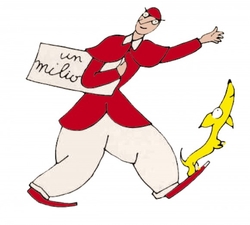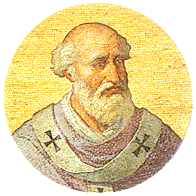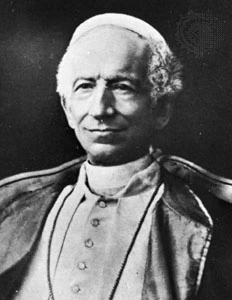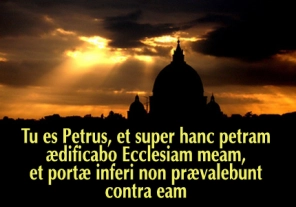Daily Archives: January 5, 2014
The Pope Without Faith
Decidedly, Francis is the poison that keeps on poisoning.
From Vatican Insider
“Being a Jesuit is to be a person of incomplete thoughts, open thought: why always think looking at the horizon which is the glory of God always great, who surprises us relentlessly. And this is the ‘ anxiety of our void. That holy and beautiful restlessness.”
“This was how Jorge Mario Bergoglio – who entered the Society of Jesus 55 years ago – described himself and his fellow Jesuits”.
As always, Bergoglio’s words are fluff made of almost nothing; still, behind their apparent meaninglessness they vaguely, but clearly enough, suggest the most disquieting attitude. Modernism at work.
Clearly, this man has doubt as his own religion, and he is proud of it.
No surprise he does not believe in Catholicism. No surprise he hates those who profess the Catholic Truth with unflinching loyalty. No surprise he chose to become a Jesuit.
What a shame for the Church. What a daily provocation. What arrogance masqueraded as humility.
Please pray that this man may change his tune, of be taken away from us.
The SSPX rosary crusade is the best way to do it.
Mundabor
Francispeak At Work: Jesus’ Miracle Of The Fish And Loaves.
The Year of The Lord 2014 is very young, and Pope Diana has already found a way to confuse and scandalise Catholics in that typical sly, slimy, Modernist, Jesuitical way of his. This time, the attack is directed at that miracle of Jesus called the “multiplication of the Fish and Loaves”.
For you Jesuit Popes out there: multiplication of loaves of bread, or of fishes, means that through a miracle of Jesus, the bread loaves and the fishes have been multiplied. So much so, in fact, that in the end there was enough to feed thousands, and to spare.
It doesn’t seem very complicated to me: there is a multiplication, and this multiplication is a miracle. You can’t do that. Jesus can. Anytime. Why do you believe that Jesus can multiply breads? Because you believe that Jesus is God. Why do you believe this particular miracle? Because it is in the Gospel.
But what if you, say, do not believe that Jesus is God? Then you will not believe that he can make miracles, at least not of his own. Similarly, when you doubt the miracle but you happen to be, say, Pope, you must say things in a way that show you don’t really see the miracle as a miracle, whilst avoiding the statement that there was no miracle.
How do you do that? With Francispeak.
As I have already explained, Francis rather likes Francispeak. It allows him to make the world understand he is on their side, without being openly the enemy of Christ. Ambiguity and duplicity are more than sufficient for the army of Satan to do their work, whilst the many Christian Pollyannas will simply refuse to see that something is seriously wrong. With this Pope, an awful lot is seriously wrong.
So let us see the way Francispeak works. He is speaking of the miracle of the multiplication of the breads and fishes last June. His words are as follows (emphasis mine):
Jesus trusts in the heavenly Father without reserve; he knows that for him everything is possible. Thus he tells his disciples to have the people sit down in groups of 50 — this is not merely coincidental, for it means that they are no longer a crowd but become communities nourished by God’s bread. Jesus then takes those loaves and fish, looks up to heaven, recites the blessing — the reference to the Eucharist is clear — and breaks them and gives them to the disciples who distribute them… and the loaves and fish do not run out, they do not run out! This is the miracle: rather than a multiplication it is a sharing, inspired by faith and prayer. Everyone eats and some is left over: it is the sign of Jesus, the Bread of God for humanity.
These astonishing words are very similar in their implied meaning to what we read here; an interpretation too unorthodox even for “Catholic Answers”.
Notice this: he never says explicitly that a miracle – as in: the miracle of multiplying food, so that thousands instead of a dozen or two might be fed – has not taken place. But then he inserts a Francispeak expression, in which he redefines the word “miracle”: not the multiplication is a miracle, but this fluffy, utter V II concept of “the sharing”. For Francis, the miracle consists in the sharing. Mind, the miracle is still called a “miracle” so that the Pollyannas may swallow it whole, but it is also called a “sharing” so that everyone with a brain knows what Francis really thinks.
Did the people eat “sharing”? No. They ate bread and fish. Why did they ate it? Because Jesus multiplied it. The miracle consists, as every child who has never heard of Jesuits will tell you, in the multiplication of breads and fishes, full stop.
But now imagine our intrepid Pontiff at dinner with his buddy, Rabbi Skorka. The Rabbi cannot admit that Jesus multiplied the fishes and the breads, because he perfectly well knows that this means to admit that Jesus is God. At this point, the dinner becomes a tad, ahem, “divisive”. Francis cannot admit that, of course. If Jesus is allowed to put Himself between him and his buddy something must be wrong, ah, eh, no? What would, then, a Jesuit do? Twist the words, to the point that the white becomes black, the opposites are reconciled, and the reality of the miracle is not openly denied, but transformed to the point that even Rabbi Skorka cannot have any problem with it.
An expression like “the sharing is the miracle” means perfectly nothing from a theological point of view. You can say that friendship is “a miracle”; or love; or a beautiful sunset; or a fluffy little kitten; or pretty much everything you want to link with a positive idea of innocent wonderment, and achievement of good hearts. Alternatively, you can mean – like the priest cited by “Catholic answers” – that Jesus teaches generosity and “sharing” as an act of giving: it appears there isn’t enough to eat, but in fact there is, once the “have” have been taught to share with the “have not”.
Rabbi Skorka can certainly live with this “miracle of sharing”, without any problem. Every Hindu could; every Muslim; even every Atheist! What has gone lost in the meantime is what has really happened, and the consequences of the event: that Jesus can multiply breads and fishes, and he can do it because he is God.
Francispeak is here in action with another bending over forward: it says and it denies, it allow to accept and to refuse, it is edible for Christians Pollyannas (not the orthodox ones) and for assorted infidels.
“Ah”, the Pollyannas will say: “he said that, but he did not mean it! Whenever the Pope says something wrong, we must understand that he has said something right! It must have been a mistake, surely?”
Yeah, right. Unless Francis does it again, stating just a couple of days ago that the miracle is a “parable” and causing poor Jimmy Akin to break in a very sweaty exercise in mental gymnastics, at the end of which he can’t find anything better than to say he must have meant “miracle” instead of “parable”.
If Francis is completed demented, yes, I agree. Otherwise, I am afraid when he said “parable” he meant “parable”, because that’s just what he said. If Francis doesn’t know the difference between a parable and a miracle he has no business being a priest, much less a bishop, least of all the Pope.
Now, the first two or three times you might say Francis has been “unguarded”; but heavens, this man strays from basic Catholicism day in and day out! How long does it take to understand that he is just does not care for Catholicism? Nor should you be deceived from the fact that on other occasions, Francis might have referred to the miracle as “miracle”. Firstly, you have seen in the phrase mentioned above that for a Modernist words mean nothing else than what he wants them to mean (the “miracle” is, in fact, a “sharing”; but he still calls it a “miracle”); secondly, it is typical of the Modernist strategy to confuse truth with lie, speaking sometimes truth and sometimes heresy, as brilliantly stated in Auctorem Fidei:
“mixing at times one with the other in such a way that he was also able to confess those things which were denied while at the same time possessing a basis for denying those very sentences which he confessed”.
Jorge Bergoglio has created his own bespoke religion, probably for some decades now; this religion of his allows him to do and think whatever he pleases, and exempts him from being Catholic in every recognisable meaning of the word. Now that he has been made Pope, he proceeds to spread the word of this religion of his, of which he is so fond.
Beware of the wolves speaking of “parables”.
Mundabor























You must be logged in to post a comment.